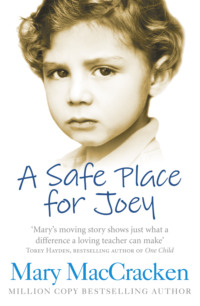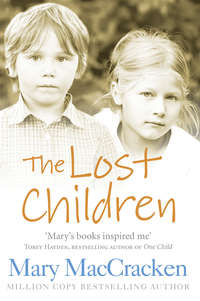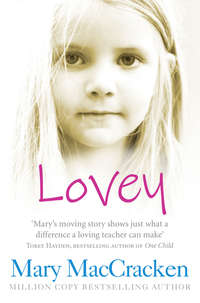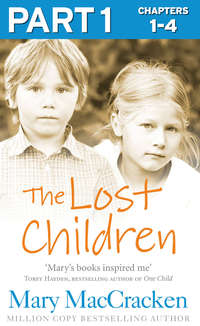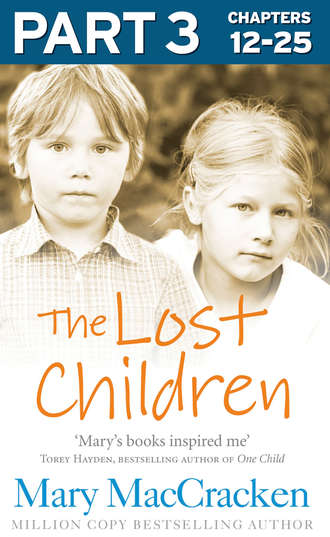
Полная версия
The Lost Children: Part 3 of 3
If it is hard for the returning children, it is even harder for the four new ones, two boys and two girls.
Tony, seven years old, black eyes bright, perches on a table beside me. “Kee-rist. What a bunch of weirdoes.” Tony’s mother ran away when she discovered she was pregnant again, and he lives now in a single motel room with his father and his father’s mistress. Before the morning is out I am extracting a five-dollar bill that he is transferring from my purse to the inside of his shoe. When I take it back, Tony yells in rage. “See. I knew it. I knew it. You goddamn whore. No matter what you look like, you’re mean. Mean. Like all the rest of them.”
Alice is the first girl for either of us. She is twelve, with tight blond braids and angry, slanted eyes. She spends the first hour drawing at the blackboard as the others arrive, drawing huge ice cream cones, labeling in careful letters each mound of ice cream … vanilla breast … chocolate breast … butter pecan breast. Twenty-seven flavors?
Dan asks her what she’s doing and she says, “Shut up. I want my own way in the world. Why can’t I have my own way in the world?”
“You better take her,” says Dan. “She seems to need a maternal influence.” “Thanks a lot,” I say.
Jenny Woodriff is our second and only other girl. She isn’t new; she had been in Renée’s class, but neither Dan nor I had known her well. She is eight but seems much smaller because she walks doubled over, hands almost touching the ground. Her auburn curly hair is pulled down over her eyes, hiding most of her face. She doesn’t speak; she only barks. Jenny thinks she is a dog.
“She’s for me,” says Dan.
“Aw, come on. You’re making all the decisions.”
“Okay, okay. You get to pick the next one.”
Rufus stands in the doorway dressed like a middle-aged businessman, blue suit, necktie, glasses, large briefcase held in front of his fat stomach.
“I am Rufus Jay Greenberg,” he announces. “I live at Six-eight-nine Harrison Avenue. You may call me Rufus, or Rufus Jay – or if you are very angry, Rufus Jay Greenberg.”
“Come on in, Rufus,” I say.
Rufus extends his hand, warm, moist, pudgy, and says, “Is that what you are going to call me?”
“I guess so. Would that be okay? What do your friends call you?”
For the first time he looks up and I can see the nystagmus that moves his eyes rapidly back and forth, back and forth, like the carriage on a typewriter.
“I don’t have any friends,” he says.
He spreads his arms wide, the briefcase still dangling from his right hand, and sails to the farthest corner of the room. He pulls a wooden toy chest away from the wall and squats behind it, arms wrapped around his briefcase.
Rufus is eight. His family moved to the area so that Rufus could attend our school. Both his mother and father had given up good jobs to make the move, she as a teacher, he as a chemist in a large pharmaceutical firm. Rufus had been in a “special school” in Pennsylvania and, because of the family’s educational and chemical-medical background, had been tested and retested. Rufus’ file is thicker than the rest of my children’s put together. He has been given tests by psychologists, psychiatrists, neurologists, in major cities all over the East. Each report differs from the next: – “normal intelligence with emotional disturbance” – “retarded” – “brain-injured” – “normal to bright” – “normal with schizophrenic tendencies.”
How could there be so many different opinions? No wonder the parents were discouraged and Rufus himself had an absentee record that was higher than the days he had attended school.
“I want him,” I say to Dan.
Brian’s bright, pointed little face contorts with un-happiness. He copes with jealousy by accelerating his flapping and uttering the old-time squawk, “Awk, awk. Gonna go to the doctor’s.”
Finally we are all there, the six boys – Dan’s Tom and, Ivan from last year, my own Brian (Matthew is in a neurologically impaired class in a public school) and Stuart, and now the two new boys, Rufus and Tony, and the two girls, Alice and Jenny.
We had our own circle now, the eight children – Tom, Ivan, Tony, Jenny Woodriff, Brian, Stuart, Alice, Rufus – and of course Dan and me. Dan ran our circle but it was not called “Circle” anymore. Dan referred to it as “opening exercises.” “Circle is a baby name,” he said. “You can’t treat these kids like babies and then expect them to act like eight- or ten- or twelve-year-old kids.”
We saluted the flag and sang “America the Beautiful.” Of course, only Dan and I sang, and I have a very small, off-key voice so it was really only Dan, but he sang with gusto. And when we had finished singing about America he got out his guitar and sang “A Frog He Did A-courtin’ Go” and “He’s Got the Whole World in His Hands.”
By the end of the second week Stuart began to sing with us in a high, clear tenor. Neither of us had ever heard him sing before, but now he was totally absorbed. Feet off the ground, legs stretched straight out in front of him, eyes fixed on a distant point, hands moving in some ritual before his face, Stuart sang. He knew the words, he knew the tune. Across his head, Dan and I exchanged looks of satisfaction.
It was not so easy with some of the others. Ivan never uttered a word and Dan saluted the flag with one arm around him to stop his constant whirling. The flag excited Ivan, and it was not until we appointed him flag-bearer that he stood still and stared in fascination at the flag he held. Jenny Woodriff didn’t sing, of course. At first she refused to sit, pushing the chair away and squatting on the floor, her hands curled in front of her chest like a small dog begging. Dan would not let her stay there: he lifted her up and put her in the chair – “Hey, bear, keep your bottom on the chair” – and held her there while she yelped in fury. Gradually she relaxed and one day she sat, leaning her small body against Dan as he strummed his guitar. When he sang directly to her, “‘Miss Mousie, will you marry me? Mm-hmm, Mm-hmm,’” I was certain that a smile was not very far away.
Beside me that first day of school, Alice clutched the seat of her chair with both hands and pounded it against the floor, filled with rage at having to leave her ice cream breasts. Between clenched teeth she muttered, “I want my own way,” and suddenly she stood up and flung the chair across the room, barely missing Rufus. Dan sat quietly, looking not at Alice but at me, and I knew this was mine to handle. I knew that Dan was thinking that I must set the limits now, establish my own relationship with this strange, tormented girl. He would help me if I needed it, but he would not do it for me.
I stand, too, and look at Alice. “What’s wrong? Tell me. Can you tell me?” Alice snarls some curse and then spits directly in my face.
“Chairs are for sitting,” I say. “Get it, please, and bring it back,” and I let the spittle remain upon my cheek. Tears suddenly burst out of Alice, and she goes and leans against the wall and puts her head against her arm. I follow and turn her from the wall and put my arms around her, and Dan keeps singing, “… little bitty baby in His arms, He’s got the whole world in His arms.”
“Come on now,” I say finally, “Let’s get the chair and go back,” and Alice goes and brings it back and we both sit down again.
Within a month, however, our opening exercises have gained form and structure, incidents of this kind are rare, and everyone is singing except Ivan and Jenny Woodriff.
Directly after these opening exercises we have our academics. In those first few days of the new term I think often of Matthew and wonder how he is doing in the new neurologically impaired class that has been established in his home town. I miss his blond head, but I am glad he qualified for the class. His speech had been coming faster and faster in those last days and I feel sure that he will get the help he needs.
I am going to school three nights a week now, driving down to the State Teachers College, taking courses called Introduction to the Handicapped, a prerequisite for all other courses; Teaching the Socially Maladjusted and the Emotionally Disturbed; and Art in Special Education. I attended faithfully and finally earned three As, but my disappointment in the courses became disillusionment when they asked me to give three lectures on the emotionally disturbed. Ah, Helga, how much more I learned from you.
Helga taught me first to begin where the child is. Never assume – always find out. In more academic language this means diagnose, teach, diagnose, teach. Never go blindly on from lesson plan to lesson plan, as they seemed to suggest at college, with so much talk of lesson plans, unit teaching, curriculum planning. Which of those professors had been in a class like ours, I wondered?
My job, as I saw it, was to teach the children how to live within homes and communities. If what I taught contributed to that, good; if not, it was a waste. The children obviously had to learn self-help and certain social skills. They had to learn how to adapt their behavior so that it would be acceptable to the society in which they lived. They could not, for instance, continue to spit or masturbate in public; these actions would earn them ridicule or isolation, and they must be taught to control them or substitute other, more acceptable behavior.
This aspect of teaching’s first and foremost. We must first reach the children, reach through the rage and fear and hate, before we can teach. This is why we are called therapeutic teachers.
However, I did not believe in basket-weaving.
Unless, of course, you happened to love basket-weaving above all else. For me, it was communication: the give-and-take between people – spoken, written, however it came – and I wanted to give my children the chance to learn these things. I had read their records, their testing; all of it was sketchy, but every indication was that they were of normal intellectual ability, or above. They deserved to be allowed to learn the techniques of communication.
The other teachers thought I was somewhat ambitious. They were kind and encouraging, but it did not have the same importance for them as it did for me. And yet, if what I loved and wished to teach was reading, I had as much right to teach that as potato-printing. In the children’s world of violent emotion, where everything continually changes, I thought it would be satisfying for them to know that some things remain constant. A C is a C both today and tomorrow – and C-A-T remains “cat” through tears and violence.
I began with the alphabet, in spite of the fact that Brian and Alice could already read. It wouldn’t do them any harm, and it was necessary to teach below their level so that we could function as a group. I taught them each the twenty-six symbols of our language. First to recognize them, then gradually to make them and know their sounds.
I would line the chalk tray with letters printed on cards and ask the children to bring me a D, a B or an F. As soon as they learned these, I asked them to make the letter on the board. Within the month Alice and Brian were making up their own words, Stuart could write most of the alphabet. Rufus was just beginning.
“Can you find the D, Rufus?”
Down goes his head onto one of the tables we use as desks.
“Here now, let’s see. I will make a D on the board. A big one, see? The straight line – then the fat stomach. Okay, now. D. Can you see a letter like this?”
I nudge the D card more prominently into view – and slowly, slowly, Rufus gets up from behind his desk and comes forward to where I stand. I take his finger and trace it over the D on the board, saying, “Here’s that D, Ruf. Like in ‘Dog.’ Feel here, see how it’s made.” I am trying to imprint the letter in his mind. But his body is tight with fear and when he goes to the chalk tray of cards to pick out the D, he just stands looking at them blankly. And I know that the major problem here is that Rufus is too frightened to commit himself to a choice, terrified that he may pick the wrong letter.
Finally a way out of the situation occurs to him, and he walks across the front of the room trailing his finger against the ledge of the chalk tray where the alphabet cards rest, his eyes fastened on me rather than the cards.
What is this now? Suddenly I understand. In his own way he is asking for help, and when he goes back and does it again, his eyes still on me rather than the cards, I wait. I wait until his finger touches the card marked D and then I say, “Yes, Good! That’s it. Good, Rufus.” And he looks down and picks up the card and brings it to me.
He looks at it carefully as he hands it to me,
“Is that right, Mary? Did I get it right?”
“Exactly right, Rufus. Good. That’s a D.”
His eyes focus on the letter, and the blank, scared look is gone. For an instant, at least, fear is forgotten and learning can take place.
Two weeks later when I ask for a Q and start to draw one on the board for him to trace, he walks straight to the Q and hands it to me, saying, “Who needs that baby stuff on the board?”
“Okay, fine, Rufus,” is all I say. But inside I feel that fine surge of excitement that says, “He’s going now. He’s off the ground. We’re moving.”
One thing I was certain of concerning Rufus. He was half paralyzed with fear. The ambiguity of the testing seemed somewhat more understandable to me after the first few days. Certainly not knowing the alphabet at eight years of age was below normal achievement. But what was the cause? Was it lack of capacity? Or was there something blocking the potential?
Inside myself I bet on a good average intelligence for Rufus. The phrasing of his sentences, his mannerisms, all belied retardation; it seemed more likely to me that there was some neurological impairment, some tiny section of the pathways of input and output that didn’t function properly, and that this imperfection had caused poor performance and, on occasion, failure. When you have failed often and painfully enough you will do almost anything to avoid having to try again. But I was sure – I knew – that he could learn to compensate if I could reach him. What I was trying to do was to remove his blockades of fear so that I could get through. I knew my best chance was through success. As a construction crew bulldozes through a jungle, so I tried to bulldoze my way through Rufus’ fears. Calculate how far he’d come, open up the situation to the degree where success was ensured – then get him to try.
The main difficulty was trying to teach on widely spread levels and keep everyone interested and learning.
As Rufus hands me an M, I say to Brian, “Give me a word that begins with M, Brian.”
“Mother,” he says.
“Good. Spell it, Alice.”
“M-o-t-h-e-r.”
“Okay, fine. Use it in a sentence, Stu.”
Конец ознакомительного фрагмента.
Текст предоставлен ООО «ЛитРес».
Прочитайте эту книгу целиком, купив полную легальную версию на ЛитРес.
Безопасно оплатить книгу можно банковской картой Visa, MasterCard, Maestro, со счета мобильного телефона, с платежного терминала, в салоне МТС или Связной, через PayPal, WebMoney, Яндекс.Деньги, QIWI Кошелек, бонусными картами или другим удобным Вам способом.



